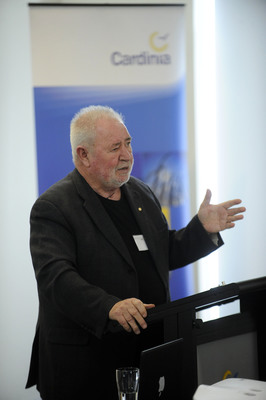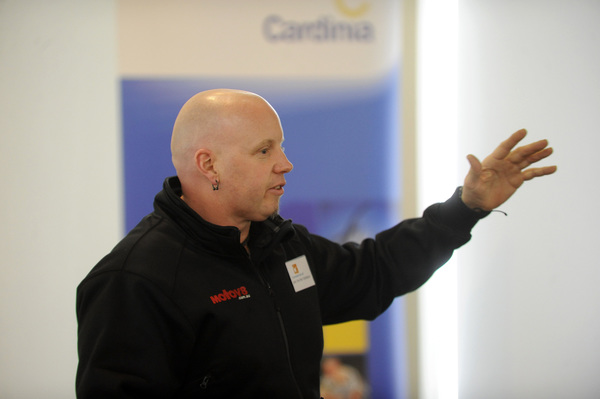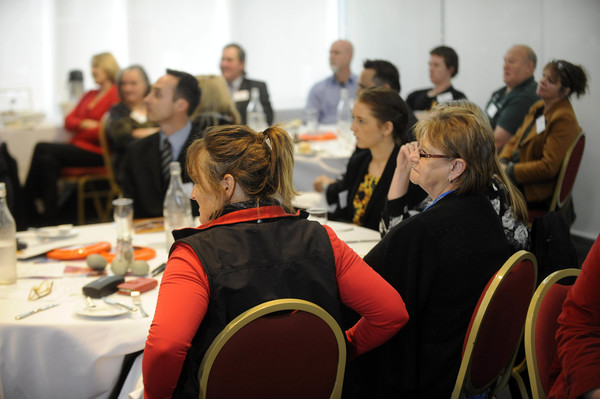
By LACHLAN MOORHEAD
TEENAGERS who drop out of school are being increasingly targeted by drug traffickers looking to push their product through the streets.
Les Twentyman, the renowned youth outreach worker and community activist, stressed the importance of preventing kids dropping out of school, speaking at a special Communities That Care (CTC) luncheon held last Tuesday at the Cardinia Cultural Centre, in Pakenham.
Cardinia Shire was previously chosen as a randomly selected community site to participate in the CTC program – an evidence-based early intervention program which aims to improve the health and well-being of children and young people.
CTC receives funding from the Community Crime Prevention Unit, within the Department of Justice.
Last week’s luncheon was emceed by Motorv8 director John McMahon and attended by several local councillors and Bass MP Brian Paynter
As the keynote speaker, Mr Twentyman spoke in detail about Victoria’s concerning high school dropout rates.
According to statistics collected from the Adolescent Community Profile (2010) for Cardinia, Year 12 or equivalent attainment rates in the Cardinia Shire were listed at 77.5 per cent, lower than the state average of 84.2.
In addition, Cardinia Shire was ranked 61 out of 79 Local Government Areas in Year 12 or equivalent attainment rates, while the municipality had also experienced higher absenteeism rates across Grade 1 through to Year 11, compared to the Victorian average.
“In 2013, there were 14,200 kids suspended from schools in Victoria, last year it was a little bit better, 13,000. Now that’s 27,000 kids suspended in two years,” Mr Twentyman told guests at the luncheon.
“That might solve the problems on the school campus, but it creates problems for us at the coal face because those kids aren’t going to the library, or helping with the shopping, they are the ones being targeted by the drug cartels.”
Mr Twentyman also shared insights he’d gathered from a recent visit to the Metropolitan Remand Centre in Ravenhall, where he spoke extensively with prisoners.
“I was in there and spoke to 60 prisoners and I asked them, how many of you left school, or were kicked out of school before Year 10?” he said.
“And the whole 60 people put up their hands. I then said how many of you then went into drugs and crime, every hand went up.
“I then asked them, how many of you have ever had a job and only five people had ever had work and that is again one of the big factors we have to deal with, that we’ve got kids that are dislocated …”
Later on, one of the prison supervisors mentioned if Les could ask a question of the prisoners that they would not dare ask themselves.
“She said we want you to ask them about their gang membership in the prison,” he said.
“So they came back in and I waffled on for a few minutes and I put up a video … talking about LA gangs, and I said to them what about the gang membership in here? And they all just sat there frozen, eyes darting around and finally one kid that I knew, he said if you’re not in a gang in here, you are dead.
“So putting kids in prison is not solving anything.”
Mr Twentyman also played two films during his presentation, the first of which was entitled ‘The ice age’ a documentary put together by international news organisation Al Jazeera and detailing the extent of methamphetamine abuse in Victoria particularly.
“Victoria is considered the ice capital, not just of south-east Asia, but possibly the world and it’s become a massive problem,” Mr Twentyman said.
“Our jails are full, we’ve got problems around young kids with a fractured education … this particular video you’ve got the police, you’ve got the ambos, you’ve got parents and you’ve got young people talking about the problem that they have because they’ve been taken captive by this substance.”
For more information, and to donate to Cardinia’s Communities That Care program, contact Facilitator Amy Moore at a.moore@cardinia.vic.gov.au, or call 5945 4484.








